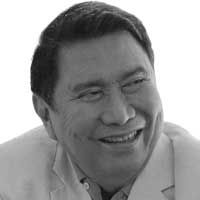The case of ‘the butcher’

The upholding by the Court of Appeals of the conviction of retired Army major general Jovito Palparan has surely demoralized the military that’s waging a decades-old war against the New People’s Army (NPA).
Palparan, referred to as “the butcher” by leftist groups but called “my hero” by former president Gloria Macapagal-Arroyo, was an NPA nemesis.
In NPA-infested areas where he was assigned, Palparan made the communist rebels always on the run.
Under his command, Army soldiers almost always scored victory after victory over the NPA during firefights, the reason he was respected and loved by law-abiding civilians and feared by rebels.
Palparan, one of the few officers who did not graduate from the Philippine Military Academy (PMA) to reach the “star” rank, maintained peace and order in areas with high crime rates when there was a lack of police presence.
The Bulacan court that convicted Palparan for the disappearance of two female students of the University of the Philippines (UP) was probably influenced by the administration of president Noynoy Aquino, who had no love lost for his predecessor.
Palparan was a favorite general of president Arroyo.
The court relied on the testimony of a witness, a farmer detained on suspicion of being an NPA member or sympathizer, who said he saw Palparan in the vicinity of the area where the two students – Karen Empeno and Sherlyn Cadapan – were being detained.
How would the court have known that the witness perjured himself so he could get back at Palparan’s subordinates for his detention?
The witness told the court a story of soldiers maltreating and killing civilians in his presence.
Whoa, whoa! Why was the witness spared after seeing all that blood and gore in his presence? The soldiers could have killed him as well, so there would be no witnesses.
Hasn’t the Bulacan court come across the saying, “dead men tell no tales?”
Fellow soldiers love Palparan for being a rightist, as members of the military establishment are expected to be.
When PNoy Aquino tried to have Palparan placed in a civilian jail while undergoing trial, the Armed Forces protested, saying he should be accorded due respect by having him confined in a military stockade; Noynoy relented.
Palparan’s conviction is nothing compared to the conviction of US Army 2nd Lt. William Calley by a military tribunal in 1971 at the height of the Vietnam war.
Calley and his men shot and killed 22 civilians in a village in Vietnam in what has become known as the infamous My Lai Massacre.
Three days after Calley’s conviction, then president Richard Nixon transferred him from a military prison and placed him under house arrest.
Commander-in-Chief Nixon feared a backlash from the US military.
Calley was sentenced to 20 years in prison. The sentence was later reduced to 10 years, and finally 3 years and four months. He was released in 1974.
In a survey conducted after Calley’s verdict, 79 percent of the US public disagreed with the verdict, 81 percent thought the life sentence was too stern and 69 percent thought that Calley was a scapegoat.
The US public perception at the time was that in war, massacres of civilians on both sides of the fence were not unexpected.
I’m surprised why the Philippine military didn’t ask for leniency for Palparan and several of his former subordinates who, if the accusations against them were true, committed the offense out of misplaced zeal.
Even his fellow generals were mum on the verdict. Is it because Palparan is not a PMA graduate?
The court should have considered Palparan’s status as a “hero.”
I’m also surprised why former president Gloria, who called the general “my hero” for his big role in the anti-insurgency campaign, has not asked President Rodrigo “Digong” Duterte to pardon Palparan. GMA and Digong are allies.
Look guys, I’m not a friend of Palparan, but I know that he was fair in dealing with civilians.
I once approached Palparan, then in active service, on the complaint of two ambulant vendors who said they were maltreated by soldiers under his command.
The vendors came to Isumbong mo kay Tulfo years ago after being beaten up while in detention by soldiers manning a checkpoint in Nueva Ecija.
The soldiers mistook the two itinerant vendors for NPA spies.
Their captors released them after they were able to prove they sold shoes, offering their wares from house to house. They were from Manila and not from any NPA-influenced village in Central Luzon.
Palparan listened intently to the two vendors. Then turning to the lieutenant who was the commanding officer of the soldiers said, “You better settle with these guys, otherwise I’ll have you dismissed.”
Our meeting with Palparan took place in Fort Bonifacio. He came all the way from Central Luzon to listen to the vendors’ grievances.
The next day the lieutenant (I won’t name him) came to my office and apologized profusely to the vendors. He offered a handsome amount of money – to appease them.
The vendors accepted the apology with alacrity as well as the money.
All was well that ended well. The vendors went home tens of thousands of pesos richer.
* * *
Why was the Mandaue police kept out of an apparent accident inside the plant of a consumer products manufacturer in Bgy. Tabok, where a worker was killed while cleaning a pulverizer machine on June 2?
The police could not start an investigation into the accident as they were not allowed to enter the compound.
Police said an approval from the corporation’s consultant was needed for the police to conduct an investigation in the site.
If the comapny’s management is not hiding anything, why doesn’t it allow the police to investigate the cause of the accident?
- Latest
- Trending




























